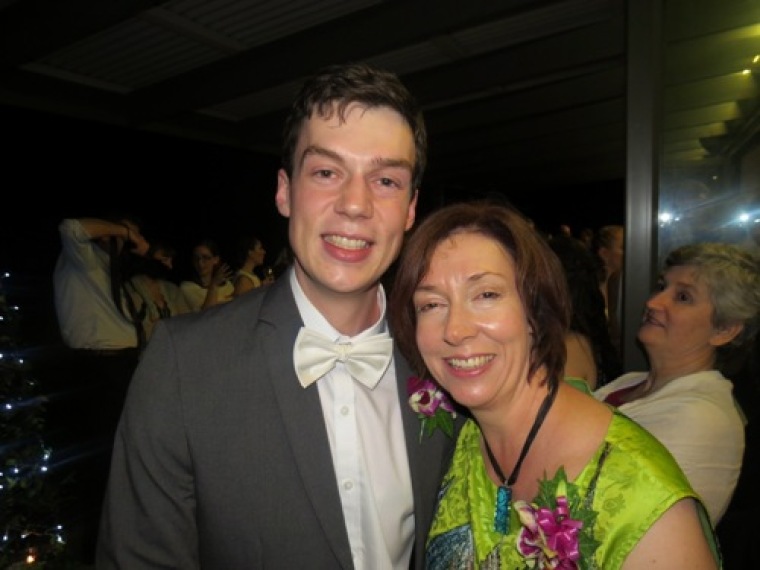
That was the tip of the ice berg and since then it's been every-which-way to offer students as many possibilities in tertiary education so as to feed both such requirements as this new brave world offers and to raise the coffers.
Even four years ago Morling Seminary (NSW Baptist) developed a distance education program for their Masters degrees although they had offered distance education for some decades for Bible College diplomas.
Today, there is a plethora of distance learning opportunities, they come with a price but having said that, it's now mainstream, game set and match. Everyone is in it as everyone has to be in it. If not, they get left behind.
But so too post graduate opportunities. There was a time, not that long ago, that unless you had a science topic, a medical research topic or some other English or historical specialist area, the chances of anyone being given a guernsey for a doctoral dissertation was next to nil.
Then in the eighties the brain drain kicked in big-time. International universities claimed an inordinate number of our brightest and best and someone somewhere in academia here in Australia called upon those now famous words, 'Enough is Enough'.
The late Right Rev Brian King and I in that period visited a senior representative of the NSW Higher Education Board. We were exploring the possibilities of linking an American university to our Theological pursuits in Sports Ministry post graduate studies. We were on the height of the wave of disillusionment and were given the green light, not as a test case, but in a spirit of resignation, that this was going to happen right across the board, regardless.
Post Modern Fiscal Enlightenment
Around that time or not long after that it became common knowledge that Australian Universities began offering post graduate study opportunities in Asia (distance education) and the entire system moved into what has been referred to as - 'post modern fiscal enlightenment'. In other words, it paid up big time.
Since that time it's been a pandora's box of goodies those in academia wanting to explore something other than traditional doctoral dissertation subjects, and when friends of ours popped up with what they thought might have been a little too much, I assured them to be quietly confident.
The world had changed. Anything with a half decent analysis would get through and sometimes the more likely it was to challenge the status quos or bring light into an area of some grey, is now favoured. Anything to prick the ears - that might draw attention to the institution and therefore additional funding from philanthropic groups or the like - is worth its weight in gold (as it were).
Robyn Gillespie from Wollongong University has come up with such a working topic for her PhD, and it's been accepted: Exploring the decision to deprescribe medications to reduce polypharmacy for older community living adults: A living well, longer challenge.
We're in an age where the baby boomers (that's my era) are slowly but surely living older and this group has the where-with-all (wealth) to politically demand better health for living well and living longer.
Robyn Gillespie
Robyn Gillespie says of this: 'This is creating an interesting situation; beyond the baby boomers, this current generation of very old Australians have reached old age in greater numbers and in better health than previous generations. This is in part due to the development and availability of medicines prescribed to treat and prevent otherwise life limiting illnesses.
These medications have been accessible at affordable rates to Australians because of our unique Pharmaceutical Benefits Scheme. An outcome of this is that many older Australians take multiple medications, referred to as polypharmacy.
However there is growing evidence to suggest that there is a point where we are potentially taking too much of a good thing. The use of more than five medications by older adults can cause serious health problems and so there is now a move to carefully assess the benefit versus the possible cost of the use of each medication.
For both doctors and their older clients the decision to remove or reduce a medication is influenced by many factors and it is these factors that I will be exploring over the course of the next three years. My topic was accepted because this new information could be used to aid both doctors and older adults as they make an informed decision regarding medication use.
Dr Mark Tronson is a Baptist minister (retired) who served as the Australian cricket team chaplain for 17 years (2000 ret) and established Life After Cricket in 2001. He was recognised by the Olympic Ministry Medal in 2009 presented by Carl Lewis Olympian of the Century. He mentors young writers and has written 24 books, and enjoys writing. He is married to Delma, with four adult children and grand-children.
Mark Tronson's archive of articles can be viewed at www.pressserviceinternational.org/mark-tronson.html